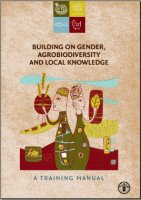
Building on gender, agrobiodiversity and local knowledge
A training manual
A publication of the Gender, biodiversity and local knowledge systems for food security ( LinKS ) Project
The present Training Manual is based on experiences collected in numerous training workshops carried out under the FAO-LinKS project in Eastern and Southern Africa. This Training Manual constitutes a conceptual guide for trainers that can be used to lead them through the issues of gender and local knowledge which are important elements for agrobiodiversity management and food security.
It is apparent, when working with this Training Manual, that agrobiodiversity and food security are complex issues that need careful consideration. The myth that technologies taught to farmers will ease their poverty and hunger because the expertise or seeds provided are modern or new, persists in many contexts.
This leads to positive results not materializing and rural farmers being faced with failed crops, or it is found that the technology applied is not appropriate to the particular situation.
There have been successes, this is true; however, a careful reading of the case studies contained in this Manual, will prompt the readers to pause and reflect. In some cases, the fine balance between wild foods and cultivated local varieties offers better solutions for local contexts and the introduction of new technologies may disturb the equilibrium.
One result of participating in the training will be a growing awareness of the importance of gender and local knowledge for sustainable agrobiodiversity management. The issues of gender, local knowledge and agrobiodiversity and their linkages are clearly explained. The sustainable livelihoods approach is used as an overall framework to understand better these linkages. In addition, the Manual gives an overview of the policies, processes and institutions at the global level that may affect farmers and agrobiodiversity in general.
The fact sheets contained in the Manual provide a general understanding of the issues. Sharing experiences and applying the participants’ knowledge and understanding will be even more important. The Manual includes some exercises which encourage participants to bring in their own experiences, share their ideas, and apply them to their own work situation.
The Manual provides tools for researchers, extensionists and those involved in day-to-day project implementation to better guide the processes that lead towards sustainable agrobiodiversity management and improved food security. Furthermore the Manual emphasizes the importance of involving the holders of local knowledge, both men and women in the decision-making process. Most important, to quote from the Manual, they will remember that ‘the entry point to agrobiodiversity management is people themselves’.
This participatory process takes time, but it leads to more effective and sustainable results.
Marcela Villarreal
Director
FAO Gender and Population Division
(Available in English, French and Portuguese)
Click here to view the document (4.7 MB) or here for the manual in Portuguese (2.2. MB)








